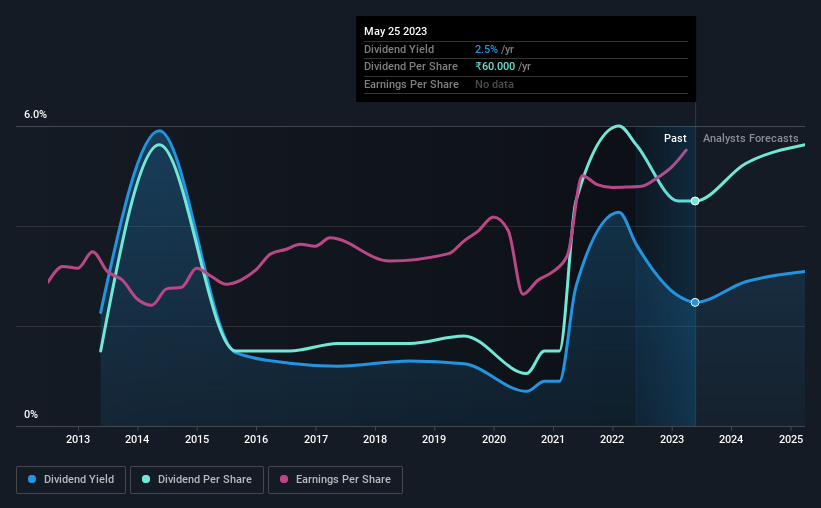Akzo Nobel India (NSE:AKZOINDIA) Is Increasing Its Dividend To ₹40.00

Akzo Nobel India Limited (NSE:AKZOINDIA) will increase its dividend on the 2nd of September to ₹40.00, which is 14% higher than last year's payment from the same period of ₹35.00. This takes the dividend yield to 2.5%, which shareholders will be pleased with.
See our latest analysis for Akzo Nobel India
Akzo Nobel India's Earnings Easily Cover The Distributions
Impressive dividend yields are good, but this doesn't matter much if the payments can't be sustained. The last payment made up 87% of earnings, but cash flows were much higher. In general, cash flows are more important than earnings, so we are comfortable that the dividend will be sustainable going forward, especially with so much cash left over for reinvestment.
The next year is set to see EPS grow by 60.8%. Under the assumption that the dividend will continue along recent trends, we think the payout ratio could be 62% which would be quite comfortable going to take the dividend forward.

Dividend Volatility
The company has a long dividend track record, but it doesn't look great with cuts in the past. Since 2013, the annual payment back then was ₹20.00, compared to the most recent full-year payment of ₹60.00. This implies that the company grew its distributions at a yearly rate of about 12% over that duration. Despite the rapid growth in the dividend over the past number of years, we have seen the payments go down the past as well, so that makes us cautious.
Akzo Nobel India Might Find It Hard To Grow Its Dividend
Given that the dividend has been cut in the past, we need to check if earnings are growing and if that might lead to stronger dividends in the future. Akzo Nobel India has impressed us by growing EPS at 11% per year over the past five years. Recently, the company has been able to grow earnings at a decent rate, but with the payout ratio on the higher end we don't think the dividend has many prospects for growth.
Our Thoughts On Akzo Nobel India's Dividend
In summary, while it's always good to see the dividend being raised, we don't think Akzo Nobel India's payments are rock solid. In the past, the payments have been unstable, but over the short term the dividend could be reliable, with the company generating enough cash to cover it. We would probably look elsewhere for an income investment.
Market movements attest to how highly valued a consistent dividend policy is compared to one which is more unpredictable. At the same time, there are other factors our readers should be conscious of before pouring capital into a stock. Taking the debate a bit further, we've identified 1 warning sign for Akzo Nobel India that investors need to be conscious of moving forward. Is Akzo Nobel India not quite the opportunity you were looking for? Why not check out our selection of top dividend stocks.
New: Manage All Your Stock Portfolios in One Place
We've created the ultimate portfolio companion for stock investors, and it's free.
• Connect an unlimited number of Portfolios and see your total in one currency
• Be alerted to new Warning Signs or Risks via email or mobile
• Track the Fair Value of your stocks
Have feedback on this article? Concerned about the content? Get in touch with us directly. Alternatively, email editorial-team (at) simplywallst.com.
This article by Simply Wall St is general in nature. We provide commentary based on historical data and analyst forecasts only using an unbiased methodology and our articles are not intended to be financial advice. It does not constitute a recommendation to buy or sell any stock, and does not take account of your objectives, or your financial situation. We aim to bring you long-term focused analysis driven by fundamental data. Note that our analysis may not factor in the latest price-sensitive company announcements or qualitative material. Simply Wall St has no position in any stocks mentioned.
About NSEI:AKZOINDIA
Akzo Nobel India
Manufactures, distributes, and sells paints and coatings in India and internationally.
Flawless balance sheet with proven track record.
Similar Companies
Market Insights
Community Narratives



